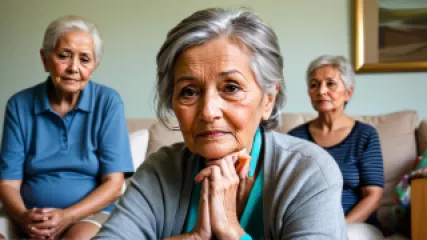Coping with Depression in Elderly: My Journey to Finding Hope
Depression is a silent battle that many individuals face, regardless of their age. However, when it comes to the elderly population, depression can often be overlooked or dismissed as a normal part of aging. As someone who has personally experienced the depths of depression in my later years, I want to share my journey to finding hope and offer strategies for coping with depression in the elderly.
The Silent Struggle
My name is Rudolf Fuller, and at the age of 75, I found myself engulfed in a sea of darkness. Retirement had brought its own set of challenges, leaving me feeling isolated and without purpose. The loss of loved ones and the physical limitations that come with aging only added to my overwhelming sense of despair. It was during this time that I realized I needed help.
Seeking therapy for aging individuals was not an easy decision. There is a stigma surrounding mental health in the elderly, with many believing that it is simply a natural part of growing older. However, I knew deep down that my mental well-being was just as important as my physical health. With the support of my family, I took the first step towards healing by seeking online therapy for seniors.
Online Therapy: Breaking Barriers
Online therapy has become increasingly popular, providing accessible mental health support for individuals of all ages, including the elderly. The convenience of virtual sessions allowed me to receive therapy from the comfort of my own home, eliminating the barriers that often prevent seniors from seeking help.
Through online therapy, I was able to connect with a compassionate therapist who specialized in senior citizen mental health programs. They guided me through the process of understanding my depression, validating my feelings, and providing me with coping strategies tailored to my unique situation. The therapeutic relationship I developed with my therapist became a source of strength and support in my journey towards finding hope.
Strategies for Coping with Elderly Depression
While therapy played a vital role in my recovery, there were also several strategies that I incorporated into my daily life to help cope with elderly depression. These strategies may not be a one-size-fits-all solution, but they have proven to be effective for many individuals:
- Establishing a Routine: Creating a daily routine helped bring structure and a sense of purpose to my days. This included engaging in activities that I enjoyed and provided a sense of accomplishment.
- Physical Exercise: Engaging in regular physical exercise not only improved my physical health but also positively impacted my mental well-being. Simple activities like walking or gentle stretching can make a significant difference.
- Connecting with Others: Social isolation is a common issue among the elderly, which can contribute to feelings of depression. Making an effort to connect with family, friends, or even joining community groups can combat this isolation and provide a support network.
- Engaging in Hobbies: Pursuing hobbies and interests that bring joy and fulfillment can be incredibly therapeutic. Whether it's painting, gardening, or playing a musical instrument, finding activities that ignite passion can help combat depressive symptoms.
- Practicing Self-Care: Taking care of oneself is essential when coping with depression. This includes getting enough sleep, eating a balanced diet, and engaging in activities that promote relaxation, such as meditation or deep breathing exercises.
A Journey to Finding Hope
My journey to finding hope was not linear. There were moments of progress and setbacks along the way. However, with the support of therapy, implementing coping strategies, and the unwavering love of my family, I began to see glimpses of light amidst the darkness.
It is crucial to remember that seeking help for elderly depression is not a sign of weakness but an act of courage. No one deserves to suffer alone, regardless of their age. If you or someone you know is struggling with depression in their later years, I encourage you to take that first step towards healing. Reach out to a therapist, discuss your feelings with loved ones, and explore the resources available to you.
"Depression is a silent battle that can be fought with the right support and strategies. It's never too late to find hope."
- Rudolf Fuller
Depression in the elderly is a complex issue that requires attention and understanding. Through my personal journey, I hope to shed light on this often overlooked topic and provide guidance for those who may be facing similar struggles. Remember, there is always hope, no matter how dark the path may seem.






